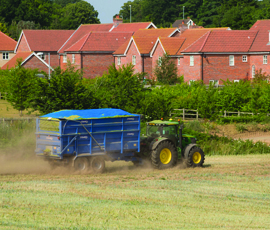Conservation credits may offer green income stream

Farmers may be able to secure a long-term income by selling conservation credits to developers as part of a process called biodiversity offsetting, it has emerged.
A series of pilot projects have been set up to test the principle of landowners selling habitat creation and wildlife management as a service to developers.
The scheme is in its infancy but it could offer some farmers an interesting alternative to existing agri-environment schemes.
The scheme is based on the premise that whenever development occurs and land currently available for wildlife and habitats is destroyed, the loss needs to be compensated for.
If the developer cannot provide sufficient compensation at the site of the development, then they can look at offsetting at a “receptor site” in the local area.
An organisation called the Environment Bank, which acts as a broker between the developer and a landowner, said pilots have been established in Warwickshire, Coventry and Solihull, Essex, Doncaster, Devon, Greater Norwich and Nottinghamshire.
If they prove successful it is anticipated the scheme will be rolled out nationwide.
Sophie Barrett, associate director at Savills, said biodiversity offsetting looked to represent a good opportunity for landowners with long-term projects in mind or looking to diversify on specific areas of land.
“The benefits are compelling,” she said. “The landowner maintains control over the long-term management of the site, is guaranteed long-term funding and retains access to, and ownership of, the land. Projects which fall within this scheme could include woodland planting, woodland restoration, hedgerow planting, restoring wetlands and arable reversion.”
What’s on offer in the scheme?
Why might farmers consider offering biodiversity offsetting?
The big advantage for farmers is the price paid for conservation credits in the offsetting market will be set by the landowners and so will better reflect the costs associated with habitat creation and restoration.
What are the disadvantages for farmers?
A farmer will only get funding if there is a development site in the locality that needs to offset. The aim is also to match habitats – so if a development results in the loss of wetlands the offset project would need to include wetland restoration. Getting the funding will therefore be about having the right sort of project.
How long would agreements last?
Theoretically, they can run from 10 to 100 years, but in the Warwickshire pilot they are looking for agreements of 30 years.
More on green schemes
